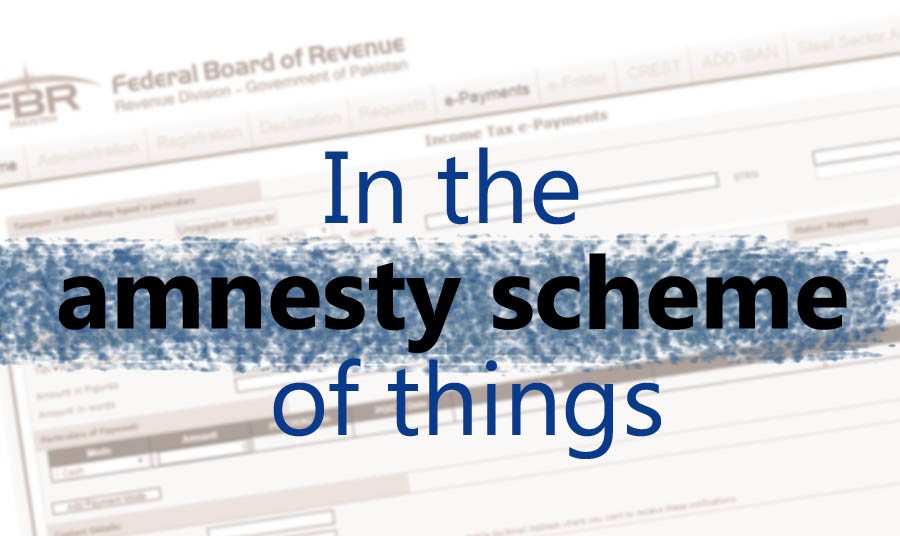
The tax amnesty scheme announced by the prime minister is being labeled as politically motivated besides raising some important questions

As the political front gets more polarised close to the elections, the outgoing PML-N regime has preferred to take what many think is a drastic step -- by unveiling the recent tax amnesty scheme. This is done as the government is about to complete its five-year term in office.
And, for this, the government bypassed the parliament, promulgated an ordinance to announce the scheme just before resuming the sessions of both houses of parliament.
Although the government intends to present the bill and get the approval of the parliament, fears still persist in the Ministry of Finance that the Senate may cause hindrance in the smooth sailing of the tax amnesty scheme bill in the next couple of weeks by passing a resolution against the ordinance or blocking the approval by forging an alliance among the major opposition political parties.
Without having full backing of the parliament, there’s no guarantee that the economic reform package announced by the prime minister, along with his Advisor on Finance Miftah Ismail, would not be reversed when the next government assumes office after the elections.
The reduction in income tax rates will be reversed although it will be difficult for any government to withdraw such an incentive because any assumption of expanding the tax base by bringing 0.8 million new taxpayers with the help of NADRA can be a good wish but difficult to materialise in haste.
A total of 10 amnesty schemes, including the existing one, have been announced in Pakistan since 1958 and all these schemes have failed in achieving the desired results.
There is an impression that the FBR’s core team was not on board for introducing this scheme. Perhaps that is why the FBR high-ups kept mum and did not publicly defend the scheme.
Secondly, massive reduction in income tax rates for individuals and Association of Persons (AOPs) from 30 to 15 per cent for earnings of more than Rs4 million was the biggest ever relief. The taxable limit ceiling was also jacked up from Rs0.4 million to Rs1.2 million a year.
These two steps excluded 5,21,000 taxpayers from paying any penny to the tax net out of a total 1.2 million tax returns filers in the country. The already narrow tax base has further shrunk. The FBR does not have a clue as to how the tax base would be broadened in the months ahead.
The FBR high-ups say, on condition of anonymity, that the tax relief would cause at least Rs90 to Rs100 billion losses to the exchequer so they would request the finance ministry to adjust downward the next fiscal year’s tax target accordingly.
The amnesty scheme provides the carrot but lacks the stick. Can this be done without granting full autonomy to the FBR, including financial and administrative?
Prime Minister’s Advisor on Revenues, Haroon Akhtar Khan, says "the amnesty provides both the carrot and stick as the government plans to tax remittances of more than Rs10 million a year, it has enacted Benami transaction law and its rules are at final stages, allowed the government to buy land if declared at less than the market rate and barred non-filers from purchasing land," adding that these measures will be used for those who are keeping themselves outside the tax net.
The political elite and tax experts agree that in the aftermath of Organisation for Economic Cooperation and Development (OECD) mechanism for exchange of information on taxation and the tightening noose of Financial Action Task Force (FATF), it will be difficult to keep the money earned through corruption into safe tax havens. The OECD mechanism for exchange of information on taxation will become effective in September this year. Is that why the government came up with the amnesty scheme to whiten the offshore assets?
To another query regarding the government’s expectation in terms of achieving success through this scheme, Khan says, "the government could get repatriation in excess of $5 billion and declaration of offshore foreign assets would be much more."
To a query about how the government would take the opposition parties into confidence in the parliament, he says, "facts will be shared with them".
Former economic advisor and senior economist, Dr Ashfaque Hassan Khan, says, "the latest amnesty scheme is politically motivated and an insult to honest taxpayers. The government has already introduced three amnesty schemes and all failed. What guarantees that this scheme can be successful? Besides, this scheme is in conflict with FATF requirements."
Read also: Estate of taxes
Regarding sharp reduction in tax rates and exemption limit, Dr Ashfaque Hassan says this will be used for election campaign purposes. "It will damage the FBR as more than half a million taxpayers will be excluded from the tax net." He also believes that "it is a conspiracy against the incoming government and will put Pakistan into the black list instead of grey in FATF."
Asad Umar, senior PTI leader says, "We have supported the tax cut and the real estate valuation reform but we oppose the amnesty scheme."